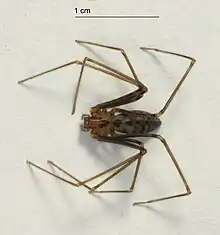Drymusa
Drymusa is a genus of false violin spiders that was first described by Eugène Simon in 1892.[2] They physically resemble violin spiders (Loxosceles), but their bites are not believed to be medically significant.[3] Originally placed with the spitting spiders, it was moved to the Loxoscelidae (now a synonym for Sicariidae) in 1981,[4] then to the Drymusidae in 1986.[5]
| Drymusa | |
|---|---|
 | |
| Drymusa sp. | |
| Scientific classification | |
| Domain: | Eukaryota |
| Kingdom: | Animalia |
| Phylum: | Arthropoda |
| Subphylum: | Chelicerata |
| Class: | Arachnida |
| Order: | Araneae |
| Infraorder: | Araneomorphae |
| Family: | Drymusidae |
| Genus: | Drymusa Simon, 1892[1] |
| Type species | |
| D. nubila Simon, 1892 | |
| Species | |
|
12, see text | |
Species
They occur in the Caribbean and South America. As of May 2019 it contains twelve species:[1]
- Drymusa armasi Alayón, 1981 – Cuba
- Drymusa canhemabae Brescovit, Bonaldo & Rheims, 2004 – Brazil
- Drymusa colligata Bonaldo, Rheims & Brescovit, 2006 – Brazil
- Drymusa dinora Valerio, 1971 – Costa Rica
- Drymusa nubila Simon, 1892 (type) – St. Vincent
- Drymusa philomatica Bonaldo, Rheims & Brescovit, 2006 – Brazil
- Drymusa rengan Labarque & Ramírez, 2007 – Chile
- Drymusa serrana Goloboff & Ramírez, 1992 – Argentina
- Drymusa simoni Bryant, 1948 – Hispaniola
- Drymusa spectata Alayón, 1981 – Cuba
- Drymusa spelunca Bonaldo, Rheims & Brescovit, 2006 – Brazil
- Drymusa tobyi Bonaldo, Rheims & Brescovit, 2006 – Brazil
References
- "Gen. Drymusa Simon, 1892". World Spider Catalog Version 20.0. Natural History Museum Bern. 2019. doi:10.24436/2. Retrieved 2019-06-01.
- Simon, E. (1892). "On the spiders of the island of St. Vincent. Part 1". Proceedings of the Zoological Society of London. 59 (4): 549–575.
- Valerio, C. E. (1974). "Prey capture by Drymusa dinora (Araneae, Scytodidae)". Psyche. 81: 284–287. doi:10.1155/1974/41354.
- Alayón G., G. (1981). "El género Drymusa (Araneae: Loxoscelidae) en Cuba". Poeyana. 219: 13.
- Lehtinen, P. T. (1986). Evolution of the Scytodoidea. Proceedings of the Ninth International Congress of Arachnology.
This article is issued from Wikipedia. The text is licensed under Creative Commons - Attribution - Sharealike. Additional terms may apply for the media files.